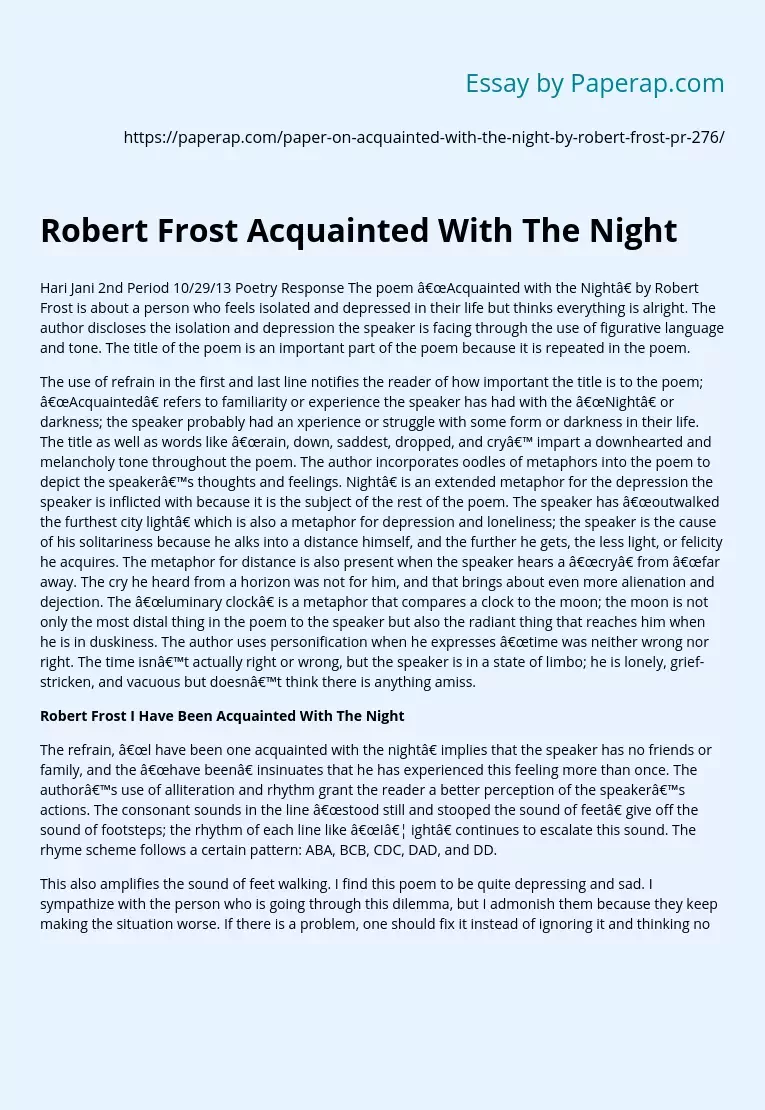Robert Frost Acquainted With The Night
Hari Jani 2nd Period 10/29/13 Poetry Response The poem “Acquainted with the Night” by Robert Frost is about a person who feels isolated and depressed in their life but thinks everything is alright. The author discloses the isolation and depression the speaker is facing through the use of figurative language and tone. The title of the poem is an important part of the poem because it is repeated in the poem.
The use of refrain in the first and last line notifies the reader of how important the title is to the poem; “Acquainted” refers to familiarity or experience the speaker has had with the “Night” or darkness; the speaker probably had an xperience or struggle with some form or darkness in their life.
The title as well as words like “rain, down, saddest, dropped, and cry’ impart a downhearted and melancholy tone throughout the poem. The author incorporates oodles of metaphors into the poem to depict the speaker’s thoughts and feelings.
Night” is an extended metaphor for the depression the speaker is inflicted with because it is the subject of the rest of the poem. The speaker has “outwalked the furthest city light” which is also a metaphor for depression and loneliness; the speaker is the cause of his solitariness because he alks into a distance himself, and the further he gets, the less light, or felicity he acquires. The metaphor for distance is also present when the speaker hears a “cry” from “far away. The cry he heard from a horizon was not for him, and that brings about even more alienation and dejection.
The “luminary clock” is a metaphor that compares a clock to the moon; the moon is not only the most distal thing in the poem to the speaker but also the radiant thing that reaches him when he is in duskiness. The author uses personification when he expresses “time was neither wrong nor right. The time isn’t actually right or wrong, but the speaker is in a state of limbo; he is lonely, grief-stricken, and vacuous but doesn’t think there is anything amiss.
Robert Frost I Have Been Acquainted With The Night
The refrain, “l have been one acquainted with the night” implies that the speaker has no friends or family, and the “have been” insinuates that he has experienced this feeling more than once. The author’s use of alliteration and rhythm grant the reader a better perception of the speaker’s actions. The consonant sounds in the line “stood still and stooped the sound of feet” give off the sound of footsteps; the rhythm of each line like “I… ight” continues to escalate this sound. The rhyme scheme follows a certain pattern: ABA, BCB, CDC, DAD, and DD.
This also amplifies the sound of feet walking. I find this poem to be quite depressing and sad. I sympathize with the person who is going through this dilemma, but I admonish them because they keep making the situation worse. If there is a problem, one should fix it instead of ignoring it and thinking nothing is wrong. IVe never been depresses or isolated, but I understand what a person going through that must feel like; the person is walking by themselves t night on a road that doesn’t go anyn. vnere.
There are probably a lot of people in the world who suffer from loneliness and woefulness. This poem teaches humans what not to do if they are inflicted with this dilemma. They shouldn’t “outwalk the furthest city light,” or “pass by the watchman. ” They should stay in the light to get help from a friend or a family member. This poem isn’t nebulous about how the speaker handled this situation; he succumbed to his worriment. This gives people a paradigm of a person who was defeated by their problems, and they should look at this and do the exact opposite.
Robert Frost Acquainted With The Night. (2019, Dec 05). Retrieved from https://paperap.com/paper-on-acquainted-with-the-night-by-robert-frost-pr-276/

